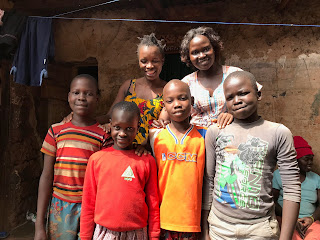In February 2017, the first Dragon’s Den
competition was held in Bakijjulula. Open to all microfinance scheme members,
it was an opportunity for individuals to pitch an idea to the ‘dragons’ and
hope to come away with a pot of money that they could use to make that idea a
reality
The criteria for the competition were that the ideas
had to be innovative, of benefit to the community, and not harmful to the
environment. After two rounds of presentations and questioning, the winners
were declared, one of which was Cosmos – a bee keeper.
Cosmos had asked for the money so that he could
grow his small bee-keeping business: get more bee-hives, get proper protective
clothing, and get the equipment to enable him to market his honey more widely
One year on, I went back to meet Cosmos and see how
he has progressed. It was a very good visit!
With the help of the money Cosmos won, his honey
business has gone from strength to strength. He now has 36 hives (he had 8 at
the time of the competition), employs someone to help him with the business,
has the protective clothing needed, and is selling his honey in Kampala.
He has also trained some of his neighbours in
bee-keeping, and he buys their honey from them to take to Kampala as well. So the neighbors now have an extra form of
income, and Cosmos has extra honey to turn into a profit.
Local farmers are also happy as they are seeing
better yields in their crops thanks to the presence of the bees,
On one of his trips to Kampala, Cosmos found out
about how to make liquid soap, so now, his journeys to Kampala see him laden
with honey, and his journeys home see him laden with the materials required to
make the liquid soap which he then sells locally.
Cosmos was saying that one beehive produces 8
litres of honey over a 3 month period, so 24 litres in a year. He sells the
honey at £6 per litre, and he has 36 beehives. The cost of packaging and
transport etc is about £1 per litre.
I’ll let you do the maths, but suffice to say,
Cosmos and his honey bees are not just helping the environment with regard to
pollinating lots of plants and trees, but they are also helping bring an income
to Cosmos, and to the others that he is working with to keep the Kampala honey
market turning.
I wonder how long it will be before entrepreneurial
Cosmos is getting his honey onto the international market?




















